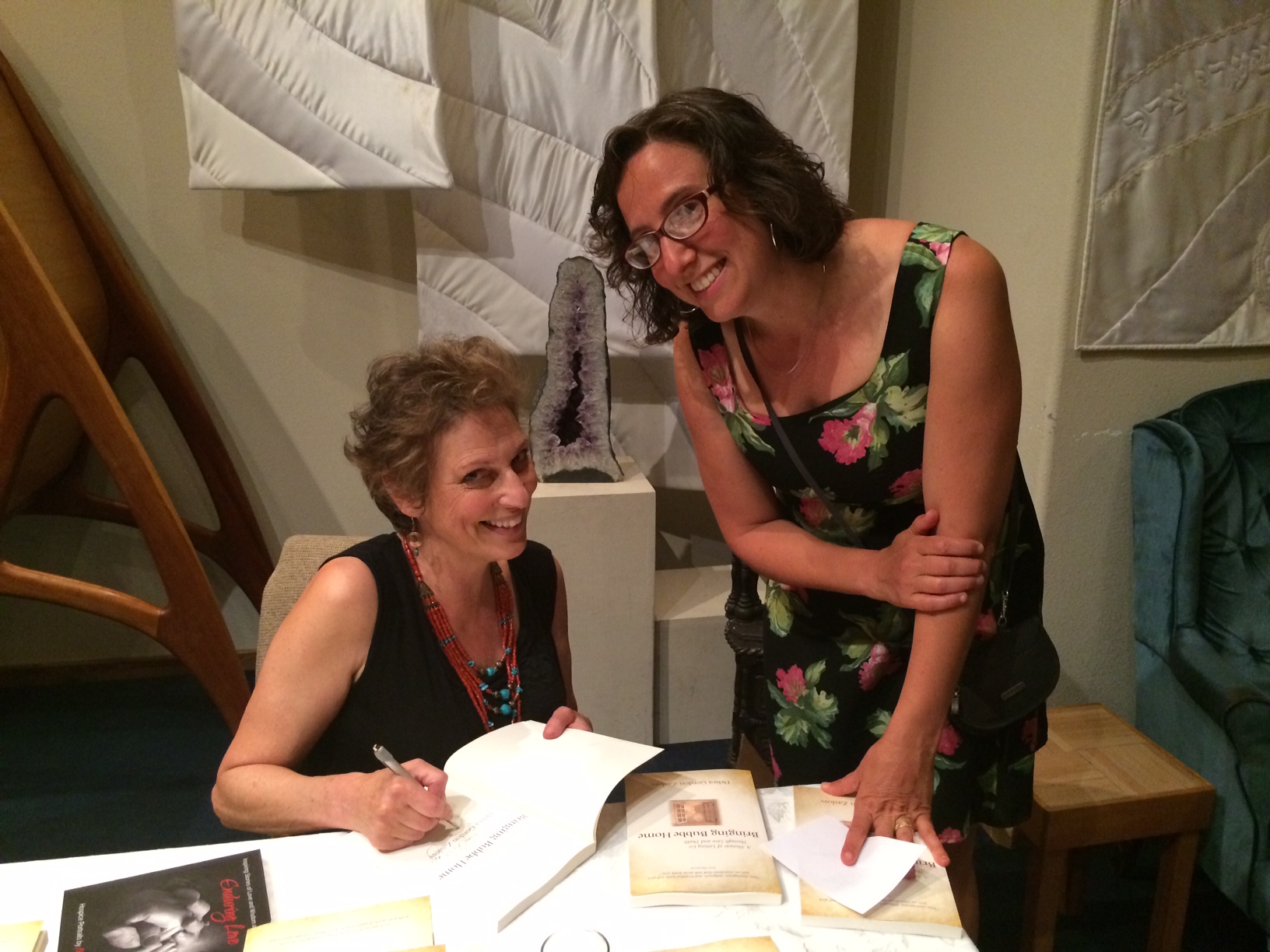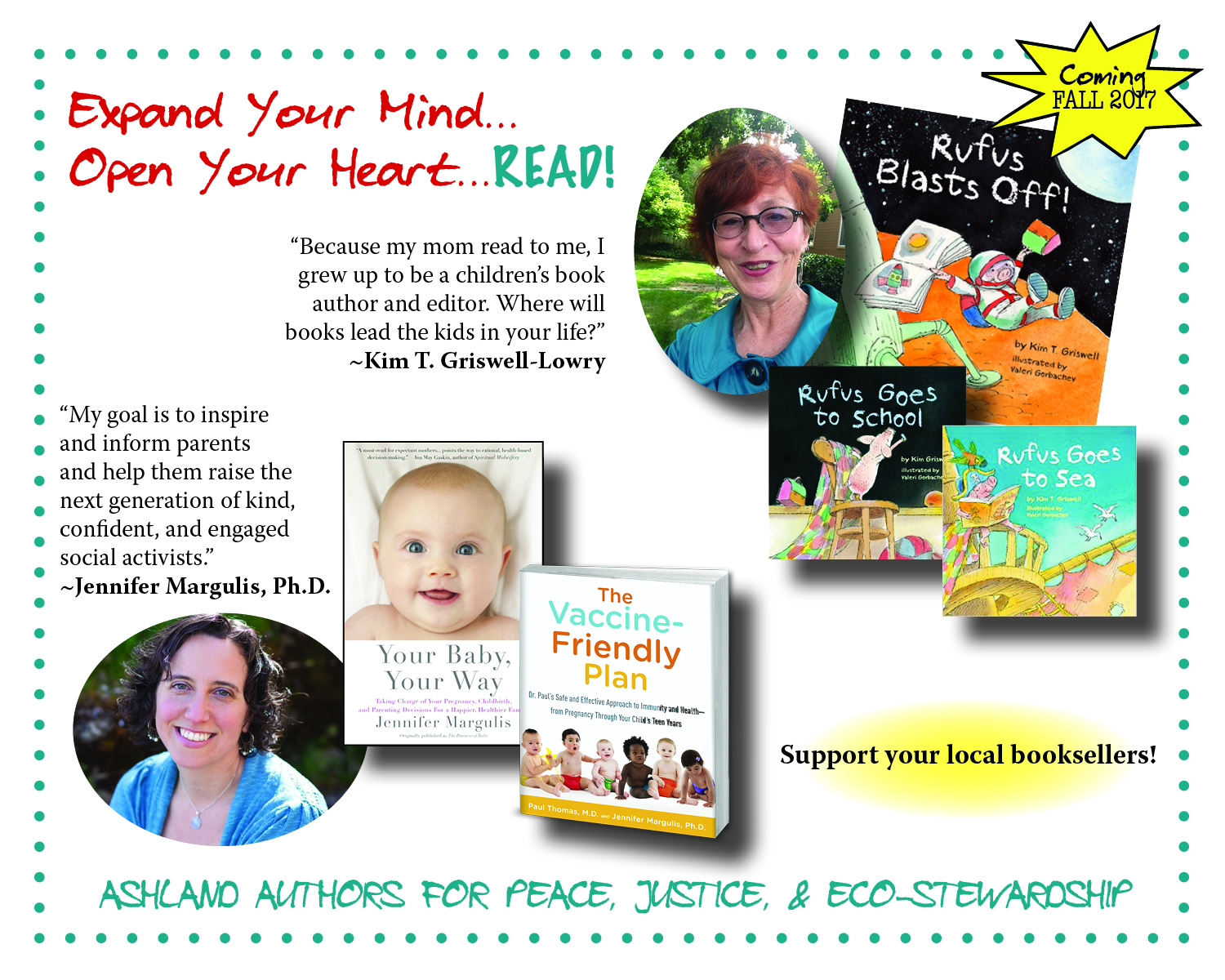
When Debra Zaslow did an author reading to share her new book Bringing Bubbe Home, she had a huge crowd. What did she do right?!
I went to an author reading and only six people showed up, five others and me. Two were the organizers and one of them had to leave early. Yikes.
I wasn’t the author reading (wipes sweat from brow), but the smallness of the audience made me cringe.
I bought two of the author’s books at that author reading.
How could I not? I felt sorry for the author.
So why such a bad showing at the author event last night?
Here are the facts:
- In our community in southern Oregon, it’s hard to get people to come out for any author readings. (It’s even hard to get them to come to parties. I don’t know why. Maybe because they are so happy and well adjusted and like staying home?)
- Especially if it is 101 degrees outside and the week of July 4th.
- Especially if the author is not well known.
- Especially if the author does not work his or her tail off to get an audience.
We want to be writers. We want to spend our time finding le mot juste and crafting the perfect plot. But once you’ve written a book don’t you also want people to read it?
The uncomfortable truth is that publishing a book, even with the biggest most respected publishing house in America, is not enough in today’s world (unless you’re Stephen King).
In today’s world, you also have to promote it, work as hard as you can to get above the noise, and make sure people come when you do an author reading.
So how can you make sure people show up, get a robust turn-out, and have a successful author reading in which you actually sell some books?
1. Go to other author readings: If you want people to support you, you need to support them. You can’t expect people to come out for your event if you’re always in your pajamas by 7:00 p.m. Showing up in real life is a powerful tool for success, one that is becoming a lost art in our digital-social-media age.
2. Join forces with other authors: There’s also power in numbers. More people are likely to show up to hear a panel of authors than just one. Each author at the reading theoretically brings part of the audience. It’s also more fun for the audience. “The most successful book events I’ve been to feature multiple authors,” says Rochelle Melander, Write Now! Coach and author of Write-A-Thon: Write Your Book in 26 Days (And Live to Tell About It). “When more than one author shares a genre—romance, mystery, YA—and they each bring their people, there’s always a bigger audience.”
3. Call everyone you know in the area and invite them personally: The author last night has some friends and contacts in southern Oregon but she didn’t reach out to them. It’s not enough to invite people via email. It just isn’t.
You have to get on that old-fashioned device called the phone.
Why?
Because we all get flooded with dozens of invitations via email, Facebook, and Evite. But how many times has a friend or someone you know who is an author called you on the real live actual factual telephone to tell you about an event and to say, “I think your presence will really enhance our evening. I hope you can come.” Never, right? But with such a kind invitation, wouldn’t you do everything you can to get there (especially if this author has shown up for you in the past, see #1)?
4. Be part of an author reading that already has an established audience: Why There Are Words is monthly literary event in Sausalito, California founded by Peg Alford Pursell to build community and showcase Bay Area fiction authors, and it is always packed. “It’s become a Thing. That people want to go to,” says my writer friend Susan Ito, editor of The Ghost At Heart’s Edge: Stories of Adoption. If you can appear at a regularly scheduled event that is already popular, you have a built-in audience and guaranteed buzz.
5. Make it worthwhile for the audience: I can’t stress this enough. Your event has to be worth going to and your audience needs to leave feeling satisfied. People are keenly interested in writing, the writing process, and the changing world of publishing. Instead of billing your event as a book promotion, try offering something concrete to the audience. If this writer had titled her talk: “How a 62-year-old middle school teacher wrote and published a YA fantasy novel, and how you can too,” or “How to write and publish a novel (you know you want to),” she would have gotten a much bigger turn-out. I know the events that I’ve done that are how-to get much larger audiences than the I-wrote-this-book-and-I’m-going-to-read-it-to-you events.
6. Serve refreshments (see #5). People always appreciate being fed! “There are always more people when edibles and drinkables are involved!” said artist and writer Anna Elkins, author of The Honeylicker Angel, who used to organize a local monthly author reading. “It immediately feels less library-ish.”
7. Entertain your audience: Don’t be longwinded! Make lots of eye contact! Don’t read boring passages (you don’t really have to read at all. They can buy the book and read it themselves). Have something to say beyond, “I’m so great, buy my book.” Be funny! When my colleague Edwin Battistella, author of Sorry About That, gave a reading recently at Bloomsbury Books (which was standing room only), he charmed the audience with a great joke at the beginning at the expense of the person who introduced him. It was brilliant.
8. Have the book signing in someone’s home: Bookstores are doing less and less to get an audience but literary salons held in private homes are often packed with eager listeners. Instead of having a venue (like a bookstore or a synagogue) host your event, find a well-connected person to invite people to his or her home.
“People like coming to homes more than going to a noisy bookstore,” says Susan Ito, who used to host a regular literary salon in her home. “We had wine and cheese and snacks, and a local bookstore actually came and sold books in my living room. Anything to make it more personal.”
9. If all else fails, remember it is quality over quantity: If your public reading has a tiny turn-out, put your whole heart into it anyway. The six people who do come may be the best connected in the area and may be able to work wonders for your book. Network like crazy with them, ask them questions about themselves and their work, and make sure they leave feeling good.
What have I forgotten? What advice do you have about how to get a good turn-out at an author reading?

All good ideas but the ones about quality and not boring your audience won’t bring the crowd in. You might also try enlisting local groups – writers’ groups, organizations like Sisters in Crime, etc.
I’m always on the lookout for ways to gather people together to enjoy good writing. Your tips are wise and insightful, starting with the most important, No. 1. We have to–get to–support each other. Readings create community for writers and readers. The list is a great reminder to find ways to connect well. Thanks for writing this!
Yes! Especially to #1. I was at Powell’s last night for Miranda Beverly-Whittemore, an out-of-town author, and she packed the place. She has Portland roots and she connected with all of us and invited us. The only thing I’d add to this wonderful list is submitting press releases, or calendar listings, to local newspapers and community websites. It isn’t always effective, but it’s a good way to bring non-friends to an event; I run a press and have authors who speak at multiple events, so it’s crucial to reach beyond our own personal networks.
Absolutely agree with all of these points. I need especially to think about #5, tailoring to the audience. Harnessing and addressing people’s seemingly limitless desire to learn “how to write” might work very well in place of the usual “X will read from her new novel.” My publisher is also trying to get me to pitch writing seminars to various venues (libraries; some bookstores do these).
This is great advice. I’m going to make it a point to go to more authors events of authors I don’t yet know.
Thanks for all this helpful advice. I’m in the midst of planning my book tour. Gorge, the story of my third Kilimanjaro hike as a plus-size adventurer, will be published by Seal Press in March 2015!
I agree with all of the above, but would emphasis that the invitations have to be personal. I do use email, but no long list-serve group mailings that let the invitee know that she is one of several dozens that have been invited. I also have cards made up before the event with a photo of the cover and date and place of the signing, and hand them out like calling cards. My last signing for The Beautiful American was standing room only. Wine sitting right there, in sight, didn’t hurt!
Great stuff. It’s great to think about alternative spaces. As the author of two pet books, I did one presentation at a local shelter and another at a cat show.
the surest way to get an audience-move out of Oregon and into affordable nj and have your events in manhattn
LOL Sherry. Why didn’t I think of that? I did three events in New Jersey and New York last year and you are right, we had great turn-outs, excellent questions from the audience, and a fascinating discussion. I fear I am an East Coaster at heart…
All great ideas. I’d also like to say that it helps to think about it as more than just a book signing or reading — think about it as a party and the book happens to be a part of that. I had great success with that when my book came out several years ago and partnered with several PR agencies who repped restaurants and event spaces. They often covered food and drinks (or did drink vouchers — one free or whatever) and loved having a big group come out to their event. In San Francisco, I partnered with a spa to do the same thing, and while sales weren’t huge, I did pretty well and everyone had a wonderful time.
Another thing to keep in mind is that venues and food/wine folks LOVE having their product in front of writers, so if you can market to them that you’ll be bringing in lots of writerly types, they will often “sponsor” the event for you. Sort of a business strategy in avoiding shelling out for wine/refreshments in some cases.
Great, practical tips.
So informative! Thank you! Pinning for my future book adventures!
I so can relate! When I first started teaching fermentation no one knew what it was but once I moved to bigger venues it was fine. Lots of great advice! Thank you, Trish
Thank yo for the wonderful advice/tips!
I haven’t written any books, but this is good advice for getting a turn out to ANY events. In my town it’s hard to pull people out of their houses as well. I always just resort to bribing with food 😉
I’m not a published author just yet, but this is definitely a great list to have handy when I am. Thank you so much for all of this information. It’s also motivating me to get the book I started months ago over the finish line!